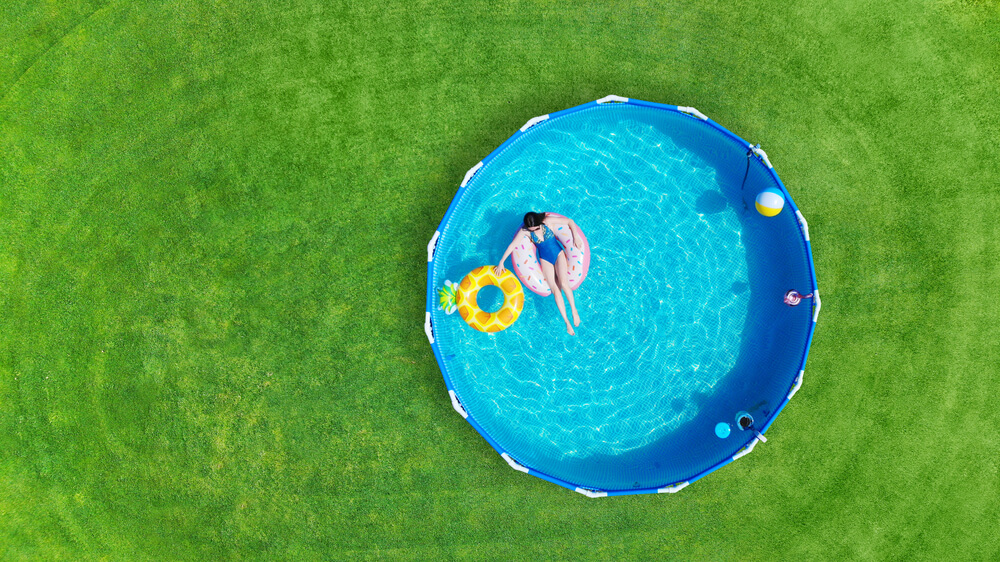
With summer just around the corner, it’s almost time to start spending lazy days in the garden relaxing and having fun. Of course, the ultimate in summer entertainment is the swimming pool. They keep you cool, give you and your family plenty of exercise, and most importantly, they’re fabulous for parties and get-togethers.
The big problem, however, is the hefty price tag that comes with an in-ground pool. At around $30,000, an average size pool is out of reach for the average person. Fortunately, there are plenty of alternatives at more attractive prices.
Above ground pools have exploded in popularity in recent years. It’s easy to see why. You can gain all the benefits of having a swimming pool in your garden without spending huge wads of cash.
However, buying an above-ground pool isn’t as simple as walking into a store and picking one up. There are a lot of things to consider before you make that purchase.
Here are our top questions to ask yourself before you buy:
What’s Your Budget?
Your budget will set the scene for your pool project. The good news is that there are pools available at all price points. Of course, the bigger your budget, the more options you will have.
Don’t forget to factor in any installation costs. Also include the cost of the filtration system, water maintenance equipment, cover, and entry ladder. These are all essential.
What’s the Pool For?
This may seem obvious. However, the requirements of someone who wants to use the pool for serious exercise will differ from the needs of a family who want something to splash and have fun in.
Think about how you will use the pool, and you will begin to understand what size, shape, and type you need.
Where Do You Intend to Install the Pool?
Location matters for swimming pools. You’re going to need to be near an electrical point. Since the pool will need electricity for its filtration system, you can’t place the pool too far from an electrical source.
Secondly, you will require a location that’s as flat as possible. This will minimize your need to do excavation work to prepare the surface where the pool will go.
Lastly, how much sun or shade do you want? Pools in full sun all day are great, but the sun can often be too intense for you to use the pool during the day safely. Entirely shaded areas can shorten the hours when it’s warm enough to use the pool as it gets cooler quicker. It’s usually best to find a site that receives both shade and sun so you can get the best from both worlds.
How Big is the Area, and is it Clear?
Pools come in every shape and size. You must know the exact size of the space where you intend to place it is. Measure your space accurately. Then measure it again to be sure.
Ensure the area is clear of obstacles that cannot be moved. For example, you can’t place a pool on top of a drain or underground access points.
Once you have the dimensions of the area, you can start hunting for pools that fit in it. Don’t forget to account for the pool access point and filtration system, which will each need a clear area, too.
Which Type of Above Ground Pool?
There are three main types of above-ground pools available. They all have pros and cons.
Inflatable Pools
These can be inflated using an electrical pump. They have minimal or no filtration. The larger inflatable pools may have a support frame to strengthen them.
- Pros: Cheapest option. Super simple to set up and takedown. Quick to fill with water.
- Cons: They are only big enough for kids or paddling. They can break easily.
Steel/Aluminum Framed Pools
These pools have solid frames and sides. They usually require a ladder to access the water. In addition, they need a good filtration and water management system.
- Pros: Hard-wearing and long-lasting. Available in large sizes that you can really swim in comfortably. You can usually disassemble and reassemble the pool if you need to move it or if you move to another house.
- Cons: These are more expensive than inflatable pools, and they require more skill to assemble. More maintenance is required, especially over the winter months.
Semi- Buried Pools
Semi-buried pools have solid sides that are typically made from metal, resin, or wood. These will be set into the ground at a depth of a few feet. They require good filtration and water management.
- Pros: A semi-buried pool can look just as attractive as an in-ground pool. Tough and durable, they are available in large sizes.
- Cons: These are typically the most expensive option. They can not be disassembled. They require considerable skill to install, as well as excavation work.
Don’t forget to check out some of the latest above ground pools for sale. The offers change frequently, so come back often to see if you can get a great deal on an above ground swimming pool that you can enjoy all summer long.
Share this:




